Books on consciousness
A list of books relating to the hard problem of consciousness. Regularly updated cos I keep finding new stuff all the time.
A list of books relating to the hard problem of consciousness. Regularly updated cos I keep finding new stuff all the time.
1998
 Bina Gupta
Bina Gupta
The Disinterested Witness: A Fragment of Advaita Vedānta Phenomenology
(Northwestern Univ. Press 1998 )
A detailed, contextual, and interpretive study of the concept of sākṣin (that which directly or immediately perceives) in Advaita Vedānta, which ends up as a fascinating comparison of the philosophies of East and West. Gupta draws attention to the philosophical side of Vedānta and one of its central epistemological notions, that of the witness-consciousness. See Northwestern | Amazon | Google
 Brian Garrett
Brian Garrett
Personal Identity and Self-Consciousness
(Routledge 1998)
What are we and why does personal identity matter? Brian Garrett, using jargon-free language, addresses questions in the metaphysics of personal identity and value theory, and discusses questions about the first person singular. An important contribution to the philosophy of personal identity and mind, and to epistemology. See Routledge | Amazon | Google
 John Sutton
John Sutton
Philosophy and Memory Traces: Descartes to Connectionism
(Cambridge 1998)
Defends two theories of autobiographical memory. One is a bewildering historical view of memories as dynamic patterns in fleeting animal spirits, nervous fluids which rummaged through the pores of brain and body. The other is new connectionism, in which memories are ‘stored’ only superpositionally, and reconstructed rather than reproduced. Both models, argues Sutton, depart from static archival metaphors by employing distributed representation, which brings interference and confusion between memory traces. See Cambridge | Amazon | Google
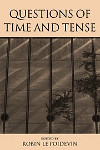 Robin Le Poidevin (ed.)
Robin Le Poidevin (ed.)
Questions of Time and Tense
(Oxford 1998)
Aims to develop and broaden a central debate in contemporary metaphysics about the nature of time: does time really pass? That is, do events become present and then recede into the past? Or is our ordinary conception of time, as consisting of an ever-shifting past, present, and future, merely reflective of our perspective on the world? An international line-up of authors contribute eleven essays, all but one specially written for this volume. See Oxford | Amazon | Google
 D. H. Mellor
D. H. Mellor
Real time II
(Routledge 1998)
This book extends and evolves Mellor’s classic exploration of the philosophy of time, Real Time (1981). This new book answers such basic metaphysical questions about time as: how do past, present and future differ, how are time and space related, what is change, is time travel possible? His Real Time dominated the philosophy of time for fifteen years. Real TIme II will do the same for the next twenty. See Routledge | Amazon | Google
 Phillip Turetzky
Phillip Turetzky
Time
(Routledge 1998)
A comprehensive history of the philosophy of time in western philosophy from the Greeks to the twentieth century. In the first half, Turetzky explores theories from Aristotle to Nietzsche. In the latter half, he describes the philosophy of time in three twentieth-century philosophical traditions: analytic philosophy, phenomenology, and a distaff tradition identified as including Bergson and Deleuze. See Routledge | Amazon | Google
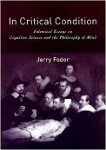 Jerry A. Fodor
Jerry A. Fodor
In Critical Condition: Polemical Essays on Cognitive Science and the Philosophy of Mind
(MIT 1998)
Fodor contrasts his views on the mind with those of well-known philosophers and cognitive scientists. Several of these essays are published here for the first time. The rest originated as book reviews in the Times Literary Supplement, the London Review of Books, or in journals of philosophy or psychology. Fodor constructs a version of the representational theory of mind that blends intentional realism, computational reductionism, nativism, and semantic atomism. See MIT | Amazon | Google
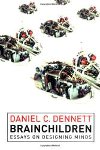 Daniel C. Dennett
Daniel C. Dennett
Brainchildren: Essays on Designing Minds
(MIT 1998)
A collection of Dennett’s essays on the philosophy of mind, artificial intelligence, and cognitive ethology that appeared in inaccessible journals from 1984 to 1996. Highlights include ‘Can Machines Think?,’ ‘The Unimagined Preposterousness of Zombies,’ ‘Artificial Life as Philosophy,’ and ‘Animal Consciousness: What Matters and Why.’ Collected in a single volume, the essays are now available to a wider audience. See MIT | Amazon | Google
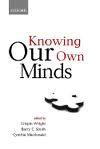 Wright, Smith & Macdonald (eds.)
Wright, Smith & Macdonald (eds.)
Knowing Our Own Minds
(Oxford 1998)
Knowledge of one’s own sensations, desires, intentions, thoughts, beliefs, and other attitudes is characteristically different from other kinds of knowledge: it has greater immediacy, authority, and salience. This volume offers a powerful and comprehensive look at current work on this topic, featuring closely interlinked essays by leading figures in the field. See Oxford | Google | Amazon
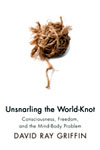 David Ray Griffin
David Ray Griffin
Unsnarling the World-Knot: Consciousness, Freedom, and the Mind-Body Problem
(Univ. California Press 1998)
The mind-body problem, which Schopenhauer called the “world-knot,” has been a central problem for philosophy since the time of Descartes. Among realists—those who accept the reality of the physical world—the two dominant approaches have been dualism and materialism, but there is a growing consensus that, if we are ever to understand how mind and body are related, a radically new approach is required. See Wipf and Stock (2008 reprint) | NewDualism.org (full text) | Google
 Jaegwon Kim
Jaegwon Kim
Mind in a Physical World: An Essay on the Mind-Body Problem and Mental Causation
(MIT 1998)
Based on Kim’s 1996 Townsend Lectures, this book presents his views on the mind-body problem, mental causation, and reductionism. Kim construes the mind-body problem as that of finding a place for the mind in a world that is fundamentally physical and redefines the roles of supervenience and emergence in its discussion. Arguing also that contemporary accounts of mental causation are inadequate, he offers his own partially reductionist solution on the basis of a novel model of reduction. See MIT | Amazon | Google
 Rae Langton
Rae Langton
Kantian Humility: Our Ignorance of Things in Themselves
(Oxford 1998)
In this refreshing and exceptional work, Langton argues that Kant’s claim that we have no knowledge of “things in themselves” is not idealism, but epistemic humility: we have no knowledge of the intrinsic properties of substances. This vindicates Kant’s scientific realism and shows his primary/secondary quality distinction to be superior even to modern competitors. It also answers the famous charge that Kant’s tale of things in themselves is one that makes itself untellable. See Oxford | Amazon | Google
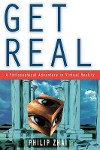 Philip Zhai
Philip Zhai
Get Real: A Philosophical Adventure in Virtual Reality
(Rowman & Littlefield 1998)
Is virtual reality merely a video game that consumes and distracts the player immersed in its simulations? Or is it an immaterial world, rich in meaning, beckoning people to a better future world inside computers? Zhai tackles these questions with keen logical analysis and advocates a stance that transcends these two opposing view of virtual reality. The thought experiments in the book are mind-stretching and enlightenling. See Rowman & Littlefield | Amazon | Google
 Tor Nørretranders
Tor Nørretranders
The User Illusion: Cutting Consciousness Down to Size
(Penguin 1998)
Nørretranders shows how consciousness represents only a tiny fraction of our ability to process information – our brains sift through and discard billions of pieces of data in order to allow us to understand the world around us. In fact, most of what we call thought is actually the unconscious discarding of information. This important book encourages us to rely more on what our instincts and our senses tell us so that we can better appreciate the richness of human life. See Amazon | Google
 Michael S. Gazzaniga
Michael S. Gazzaniga
The Mind’s Past
(Univ California Press 1998)
Why does the human brain insist on interpreting the world and constructing a narrative? In this ground-breaking work, Gazzaniga shows how our mind and brain accomplish the amazing feat of constructing our past – a process fraught with errors of perception, memory, and judgment. By showing that the brain does its work automatically and largely outside of our conscious awareness, he calls into question our everyday notions of self and reality. See Univ California Press | Google
 John Cornwell (ed.)
John Cornwell (ed.)
Consciousness and Human Identity
(Oxford 1998)
What processes of the brain can explain the uniquely personal experience we have of smelling a rose, feeling the pain of toothache, or seeing the point of a newspaper cartoon? Consciousness has puzzled philosophers, naturalists, and theologians down the ages. Now, it has caught the interest of scientists too. This book, drawing together leading figures from science and philosophy, is about the prospects of finding a scientific explanation of consciousness. See Google
 Donald D. Hoffman
Donald D. Hoffman
Visual Intelligence: How We Create What We See
(W. W. Norton 1998)
Far from a passive recorder of a pre-existing world, the eye actively constructs every aspect of our visual experience – from the strut of a peacock to the nuances of light in a forest at dusk. In an informal style replete with illustrations, cognitive scientist Donald Hoffman presents the compelling evidence for vision’s constructive powers and explores the spinoffs of this knowledge. See Amazon | Google
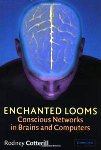 Rodney Cotterill
Rodney Cotterill
Enchanted Looms: Conscious Networks in Brains and Computers
(Cambridge 1998)
Rodney Cotterill bridges the gap between the bottom-up approach to understanding consciousness, anchored in the brain’s biochemistry, anatomy and physiology, and the top-down strategy, which concerns itself with behavior and the nervous system’s interaction with the environment. He argues that an explanation of consciousness is now at hand, and extends the discussion to include intelligence and creativity. See Cambridge | Google | John G. Taylor review
 Don Dedrick
Don Dedrick
Naming the Rainbow
(Springer 1998)
Is there a universal biolinguistic disposition for the development of ‘basic’ colour words? This question has been a subject of debate since Brent Berlin and Paul Kay’s Basic Color Terms was published in 1969. Naming the Rainbow is the first extended study of this debate. See Google | John Sutton review
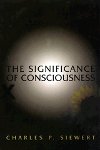 Charles Siewert
Charles Siewert
The Significance of Consciousness
(Princeton 1998)
Siewert presents a distinctive approach to consciousness that emphasizes our first-person knowledge of experience and argues that we should grant consciousness, understood in this way, a central place in our conception of mind and intentionality. He argues that the notion of phenomenal consciousness, slighted in some recent theories, can be made evident by noting our reliance on first-person knowledge and by considering, from the subject’s point of view, the difference between having and lacking certain kinds of experience. See Princeton | Google | Amazon
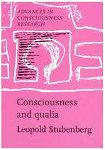 Leopold Stubenberg
Leopold Stubenberg
Consciousness and Qualia
(John Benjamins 1998)
A philosophical study of qualitative consciousness, characteristic examples of which are pains, experienced colors, sounds, etc. Consciousness is analyzed as the having of qualia and a bundle theory of both phenomenal objects and the self is proposed. This study strives for phenomenological adequacy and the first-person point of view dominates throughout. See John Benjamins | Google
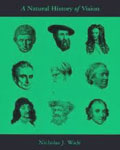 Nicholas J. Wade
Nicholas J. Wade
A Natural History of Vision
(MIT 1998)
A daring collection of documents from the history of optical studies. Wade compiles a curiously structured anthology of writers, from the 5th-century B.C. Greek philosopher Democritus to the 19th-century English musical instrument maker Charles Wheatstone, including such famous students of light and vision as Leonardo da Vinci, Isaac Newton, and Albert Einstein. See MIT | Amazon | Google Books | Metapsychology (review)
 José Luis Bermúdez
José Luis Bermúdez
The Paradox of Self-Consciousness
(MIT 1998)
Bermúdez addresses two problems: (1) Can we provide a non-circular account of full-fledged self-conscious thought and language in terms of more fundamental capacities? (2) Can we explain how full-fledged self-conscious thought and language can arise in the normal course of human development? He argues that a paradox arises from the interdependence between self-conscious thought and linguistic self-reference, from which it seems to follow that no account of self-consciousness can be given. See MIT Press | Google | Amazon
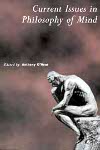 Anthony O’Hear (ed.)
Anthony O’Hear (ed.)
Curent Issues in Philosophy of Mind
(Cambridge 1998)
What is the mind? How does it relate to the body and the world? What is consciousness? What is experience? How free are we? Do we have special insights into ourselves? Much of the most exciting work in philosophy is currently being done in the philosophy of mind. The best of this work is represented in this collection, based on the Royal Institute of Philosophy’s annual lecture series for 1996/7. See Amazon | Google
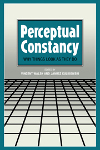 V. Walsh & J. Kulikowski (eds.)
V. Walsh & J. Kulikowski (eds.)
Perceptual Constancy: Why Things Look as They Do
(Cambridge 1998)
This volume reviews some long-standing problems in the field of perception. Experts in several fields from computational vision to comparative psychology present their approaches to some of the fundamental problems. The volume is divided into three sections. The first describes color constancy, the second examines size, shape and speed, and the third section is on perceptual inconstancies. See Cambridge | Amazon | Google

The Disinterested Witness: A Fragment of Advaita Vedānta Phenomenology
(Northwestern Univ. Press 1998 )
A detailed, contextual, and interpretive study of the concept of sākṣin (that which directly or immediately perceives) in Advaita Vedānta, which ends up as a fascinating comparison of the philosophies of East and West. Gupta draws attention to the philosophical side of Vedānta and one of its central epistemological notions, that of the witness-consciousness. See Northwestern | Amazon | Google

Personal Identity and Self-Consciousness
(Routledge 1998)

What are we and why does personal identity matter? Brian Garrett, using jargon-free language, addresses questions in the metaphysics of personal identity and value theory, and discusses questions about the first person singular. An important contribution to the philosophy of personal identity and mind, and to epistemology. See Routledge | Amazon | Google

Philosophy and Memory Traces: Descartes to Connectionism
(Cambridge 1998)

Defends two theories of autobiographical memory. One is a bewildering historical view of memories as dynamic patterns in fleeting animal spirits, nervous fluids which rummaged through the pores of brain and body. The other is new connectionism, in which memories are ‘stored’ only superpositionally, and reconstructed rather than reproduced. Both models, argues Sutton, depart from static archival metaphors by employing distributed representation, which brings interference and confusion between memory traces. See Cambridge | Amazon | Google

Questions of Time and Tense
(Oxford 1998)
Aims to develop and broaden a central debate in contemporary metaphysics about the nature of time: does time really pass? That is, do events become present and then recede into the past? Or is our ordinary conception of time, as consisting of an ever-shifting past, present, and future, merely reflective of our perspective on the world? An international line-up of authors contribute eleven essays, all but one specially written for this volume. See Oxford | Amazon | Google

Real time II
(Routledge 1998)
This book extends and evolves Mellor’s classic exploration of the philosophy of time, Real Time (1981). This new book answers such basic metaphysical questions about time as: how do past, present and future differ, how are time and space related, what is change, is time travel possible? His Real Time dominated the philosophy of time for fifteen years. Real TIme II will do the same for the next twenty. See Routledge | Amazon | Google

Time
(Routledge 1998)
A comprehensive history of the philosophy of time in western philosophy from the Greeks to the twentieth century. In the first half, Turetzky explores theories from Aristotle to Nietzsche. In the latter half, he describes the philosophy of time in three twentieth-century philosophical traditions: analytic philosophy, phenomenology, and a distaff tradition identified as including Bergson and Deleuze. See Routledge | Amazon | Google

In Critical Condition: Polemical Essays on Cognitive Science and the Philosophy of Mind
(MIT 1998)

Fodor contrasts his views on the mind with those of well-known philosophers and cognitive scientists. Several of these essays are published here for the first time. The rest originated as book reviews in the Times Literary Supplement, the London Review of Books, or in journals of philosophy or psychology. Fodor constructs a version of the representational theory of mind that blends intentional realism, computational reductionism, nativism, and semantic atomism. See MIT | Amazon | Google

Brainchildren: Essays on Designing Minds
(MIT 1998)

A collection of Dennett’s essays on the philosophy of mind, artificial intelligence, and cognitive ethology that appeared in inaccessible journals from 1984 to 1996. Highlights include ‘Can Machines Think?,’ ‘The Unimagined Preposterousness of Zombies,’ ‘Artificial Life as Philosophy,’ and ‘Animal Consciousness: What Matters and Why.’ Collected in a single volume, the essays are now available to a wider audience. See MIT | Amazon | Google

Knowing Our Own Minds
(Oxford 1998)
Knowledge of one’s own sensations, desires, intentions, thoughts, beliefs, and other attitudes is characteristically different from other kinds of knowledge: it has greater immediacy, authority, and salience. This volume offers a powerful and comprehensive look at current work on this topic, featuring closely interlinked essays by leading figures in the field. See Oxford | Google | Amazon

Unsnarling the World-Knot: Consciousness, Freedom, and the Mind-Body Problem
(Univ. California Press 1998)
The mind-body problem, which Schopenhauer called the “world-knot,” has been a central problem for philosophy since the time of Descartes. Among realists—those who accept the reality of the physical world—the two dominant approaches have been dualism and materialism, but there is a growing consensus that, if we are ever to understand how mind and body are related, a radically new approach is required. See Wipf and Stock (2008 reprint) | NewDualism.org (full text) | Google

Mind in a Physical World: An Essay on the Mind-Body Problem and Mental Causation
(MIT 1998)

Based on Kim’s 1996 Townsend Lectures, this book presents his views on the mind-body problem, mental causation, and reductionism. Kim construes the mind-body problem as that of finding a place for the mind in a world that is fundamentally physical and redefines the roles of supervenience and emergence in its discussion. Arguing also that contemporary accounts of mental causation are inadequate, he offers his own partially reductionist solution on the basis of a novel model of reduction. See MIT | Amazon | Google

Kantian Humility: Our Ignorance of Things in Themselves
(Oxford 1998)
In this refreshing and exceptional work, Langton argues that Kant’s claim that we have no knowledge of “things in themselves” is not idealism, but epistemic humility: we have no knowledge of the intrinsic properties of substances. This vindicates Kant’s scientific realism and shows his primary/secondary quality distinction to be superior even to modern competitors. It also answers the famous charge that Kant’s tale of things in themselves is one that makes itself untellable. See Oxford | Amazon | Google

Get Real: A Philosophical Adventure in Virtual Reality
(Rowman & Littlefield 1998)
Is virtual reality merely a video game that consumes and distracts the player immersed in its simulations? Or is it an immaterial world, rich in meaning, beckoning people to a better future world inside computers? Zhai tackles these questions with keen logical analysis and advocates a stance that transcends these two opposing view of virtual reality. The thought experiments in the book are mind-stretching and enlightenling. See Rowman & Littlefield | Amazon | Google

The User Illusion: Cutting Consciousness Down to Size
(Penguin 1998)
Nørretranders shows how consciousness represents only a tiny fraction of our ability to process information – our brains sift through and discard billions of pieces of data in order to allow us to understand the world around us. In fact, most of what we call thought is actually the unconscious discarding of information. This important book encourages us to rely more on what our instincts and our senses tell us so that we can better appreciate the richness of human life. See Amazon | Google

The Mind’s Past
(Univ California Press 1998)

Why does the human brain insist on interpreting the world and constructing a narrative? In this ground-breaking work, Gazzaniga shows how our mind and brain accomplish the amazing feat of constructing our past – a process fraught with errors of perception, memory, and judgment. By showing that the brain does its work automatically and largely outside of our conscious awareness, he calls into question our everyday notions of self and reality. See Univ California Press | Google

Consciousness and Human Identity
(Oxford 1998)
What processes of the brain can explain the uniquely personal experience we have of smelling a rose, feeling the pain of toothache, or seeing the point of a newspaper cartoon? Consciousness has puzzled philosophers, naturalists, and theologians down the ages. Now, it has caught the interest of scientists too. This book, drawing together leading figures from science and philosophy, is about the prospects of finding a scientific explanation of consciousness. See Google

Visual Intelligence: How We Create What We See
(W. W. Norton 1998)
Far from a passive recorder of a pre-existing world, the eye actively constructs every aspect of our visual experience – from the strut of a peacock to the nuances of light in a forest at dusk. In an informal style replete with illustrations, cognitive scientist Donald Hoffman presents the compelling evidence for vision’s constructive powers and explores the spinoffs of this knowledge. See Amazon | Google

Enchanted Looms: Conscious Networks in Brains and Computers
(Cambridge 1998)
Rodney Cotterill bridges the gap between the bottom-up approach to understanding consciousness, anchored in the brain’s biochemistry, anatomy and physiology, and the top-down strategy, which concerns itself with behavior and the nervous system’s interaction with the environment. He argues that an explanation of consciousness is now at hand, and extends the discussion to include intelligence and creativity. See Cambridge | Google | John G. Taylor review

Naming the Rainbow
(Springer 1998)
Is there a universal biolinguistic disposition for the development of ‘basic’ colour words? This question has been a subject of debate since Brent Berlin and Paul Kay’s Basic Color Terms was published in 1969. Naming the Rainbow is the first extended study of this debate. See Google | John Sutton review

The Significance of Consciousness
(Princeton 1998)
Siewert presents a distinctive approach to consciousness that emphasizes our first-person knowledge of experience and argues that we should grant consciousness, understood in this way, a central place in our conception of mind and intentionality. He argues that the notion of phenomenal consciousness, slighted in some recent theories, can be made evident by noting our reliance on first-person knowledge and by considering, from the subject’s point of view, the difference between having and lacking certain kinds of experience. See Princeton | Google | Amazon

Consciousness and Qualia
(John Benjamins 1998)
A philosophical study of qualitative consciousness, characteristic examples of which are pains, experienced colors, sounds, etc. Consciousness is analyzed as the having of qualia and a bundle theory of both phenomenal objects and the self is proposed. This study strives for phenomenological adequacy and the first-person point of view dominates throughout. See John Benjamins | Google

A Natural History of Vision
(MIT 1998)
A daring collection of documents from the history of optical studies. Wade compiles a curiously structured anthology of writers, from the 5th-century B.C. Greek philosopher Democritus to the 19th-century English musical instrument maker Charles Wheatstone, including such famous students of light and vision as Leonardo da Vinci, Isaac Newton, and Albert Einstein. See MIT | Amazon | Google Books | Metapsychology (review)

The Paradox of Self-Consciousness
(MIT 1998)

Bermúdez addresses two problems: (1) Can we provide a non-circular account of full-fledged self-conscious thought and language in terms of more fundamental capacities? (2) Can we explain how full-fledged self-conscious thought and language can arise in the normal course of human development? He argues that a paradox arises from the interdependence between self-conscious thought and linguistic self-reference, from which it seems to follow that no account of self-consciousness can be given. See MIT Press | Google | Amazon

Curent Issues in Philosophy of Mind
(Cambridge 1998)

What is the mind? How does it relate to the body and the world? What is consciousness? What is experience? How free are we? Do we have special insights into ourselves? Much of the most exciting work in philosophy is currently being done in the philosophy of mind. The best of this work is represented in this collection, based on the Royal Institute of Philosophy’s annual lecture series for 1996/7. See Amazon | Google

Perceptual Constancy: Why Things Look as They Do
(Cambridge 1998)
This volume reviews some long-standing problems in the field of perception. Experts in several fields from computational vision to comparative psychology present their approaches to some of the fundamental problems. The volume is divided into three sections. The first describes color constancy, the second examines size, shape and speed, and the third section is on perceptual inconstancies. See Cambridge | Amazon | Google
Menu
 What’s a logical paradox?
What’s a logical paradox? Achilles & the tortoise
Achilles & the tortoise The surprise exam
The surprise exam Newcomb’s problem
Newcomb’s problem Newcomb’s problem (sassy version)
Newcomb’s problem (sassy version) Seeing and being
Seeing and being Logic test!
Logic test! Philosophers say the strangest things
Philosophers say the strangest things Favourite puzzles
Favourite puzzles Books on consciousness
Books on consciousness Philosophy videos
Philosophy videos Phinteresting
Phinteresting Philosopher biographies
Philosopher biographies Philosopher birthdays
Philosopher birthdays Draft
Draftbarang 2009-2024  wayback machine
wayback machine
 wayback machine
wayback machine